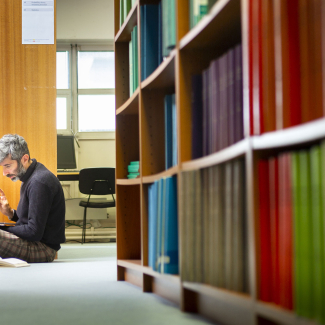
Responsible research
At the CNRS, the fundamental values of professional ethics, scientific integrity and ethics form the bedrock of the way we view our responsibility in research and innovation.
Ethics and integrity: CNRS core values
Ethics invites us to consider the values that motivate our actions and their consequences, and calls on our senses of morality and duty.
The Mission for Scientific Integrity (MIS)
Scientific integrity concerns the rules and values that guarantee that research is truthful. It is essential if we wish to expand our knowledge and ensure that the public continue to place their trust in science. Instances of disregarding scientific integrity are considered to be scientific fraud, designated by the initials FFP for Fabrication, Falsification of data and Plagiarism. In addition to this there is a broad spectrum of inappropriate practice in research, for example in the analysis and interpretation of data, or authorship conflict in publications, etc.
The MIS is mainly concerned with handling reports of instances when scientific integrity has been disregarded. It is also involved in training CNRS staff on issues of integrity and professional ethics and raising awareness, in partnership with the Ethics Officer. It is led by the Scientific Integrity Officer (RIS).
Scientific Integrity Officer contact
This role is held by Rémy Mosseri, emeritus director of research at the CNRS.
Contact: remy.mosseri@cnrs.fr
The Ethics Committee
The Ethics Committee (COMETS) is the CNRS governing body responsible for examining ethical issues specific to scientific research. In this capacity it issues opinions and public recommendations to help the CNRS and its research communities to consider the ethical issues that are raised by the practice and the social role of research.
It is an independent body with 16 members from across all disciplines, and it can call its own meetings or be called to a meeting by the Chairman and CEO, the Scientific Board or the Board of Trustees of the CNRS. The COMETS fulfils its role in partnership with the CNRS Scientific Integrity and Ethics Officers, who are responsible for handling individual cases, as well as with ethics committees at other French and European research organisations.
Ethics Committee contact
Since 1 October 2021, Christine Noiville, a lawyer and research director at the CNRS, director of the Institute for Legal and Philosophical Sciences at the Sorbonne (CNRS/Université Panthéon-Sorbonne) and chair of the High Committee for Transparency and Information in Nuclear Safety (HCTISN), has held the chair of the COMETS.
Contact: comite.ethique@cnrs.fr
Animal models
The use of animal models in research is essential if we want to understand living beings, study human diseases and develop new treatments.
Although this practice remains indispensable, it is nonetheless subject to a strict regulatory framework that requires a high level of protection for the animals used. The current regulation in France, dating from February 2013, sets out different rules depending on the animal species concerned, the origin of the animals, the accreditation of the institutions, an ethical assessment, the authorisation for research projects and animal well-being.
The 3Rs: Replacement, Reduction, Refining
Since 1959, this principle has been the foundation of the regulation on the use of animals for scientific purposes.
- Replacement – Using models other than animal models, where possible
- Reduction – Minimising the number of animals used
- Refinement – Minimising the restrictions, stress and pain
How our representative officers assist staff
Answering ethics questions
The Ethics Officer, a role set up as required by law in 2016, offers advice and opinions about issues of professional ethics (probity, neutrality, secularism, professional confidentiality, independence of researchers, complying with instructions from superiors, having multiple jobs and conflicts of interest). Both CNRS employees and authorities are able to call on them. Discussions with the Ethics Officer are subject to professional confidentiality.
Receiving and handling alerts
The CNRS Whistleblower verifies alerts received and coordinates the handling of alerts concerning a crime, an offence, a threat or harm to the general interest. A panel made up of different experts examines the reports, protecting the confidentiality of all parties concerned. Any physical person who raises an alert, without direct financial reward and in good faith, is protected from any negative repercussions if a legal process follows, and their identity is protected.
Supporting secularism
The CNRS actively protects the concept of secularism, which is enshrined in article 1 of the French Constitution, and freedom of expression, which is a pillar of democracy. These principles guarantee the protection of freedom of conscience and the richness of our diverse identities.
The Secularism Coordinator's responsibilities include answering questions from employees and management about secularism, arranging the annual day of secularism and implementing initiatives to raise awareness.
The fight against racism and anti-Semitism
A network of “racism–anti-Semitism” officers has been set up in higher education and research institutions as part of a 2015 French government plan known as “The great mobilisation of schools for the values of the Republic”.
These representatives act as a resource for students, teaching staff and all staff in the institutions. This network feeds back information, especially when there has been an incident, coordinates the week of education and action against racism and anti-Semitism, and builds partnerships with associations, institutions, museums and memorials.
Within the CNRS, a Coordinator is responsible for supporting these actions to combat racism and anti-Semitism.
Receiving and handling reports
The reporting system required by the law is fully operational at the CNRS.
The Whistleblower can be contacted by any employee by e-mail at signalement@cnrs.fr when they have been a victim of or witness to:
- An act of violence
- An act of discrimination
- Psychological or sexual harassment
- Sexist behaviour
A dedicated circular defines how the system functions: the circular of April 12th 2021 relating to the reporting system for acts of violence, discrimination, psychological or sexual harassment or sexist behaviour at work.
When the Whistleblower is contacted, it is his/her responsibility, with the support of the reporting unit, to check the report received and, respecting confidentiality, to collect all evidence for and against and investigate the reported facts. This investigation is followed by a report which enables the organisation to determine whether the information brought before them requires a disciplinary procedure to be brought.
At the same time, the reporting unit is also responsible for directing the employee who believes they were a victim or witness to such cases to any other appropriate course of action, in view of the situation referred to them (CNRS Ombudsperson, work medicine, etc.).
Contact
Joël Moret-Bailly, professor of law, currently fills the role of officer representing the following areas:
- Professional ethics
- Whistleblowing
- Secularism
- The fight against racism and anti-Semitism
- Alerts
He can be contacted at: joel.moret-bailly@cnrs.fr
To raise an alert: lancement.alerte@cnrs.fr
To contact the Whistleblower: signalement@cnrs.fr
Photo credit: © Jean-Claude MOSCHETTI / ISCR / CNRS Images

